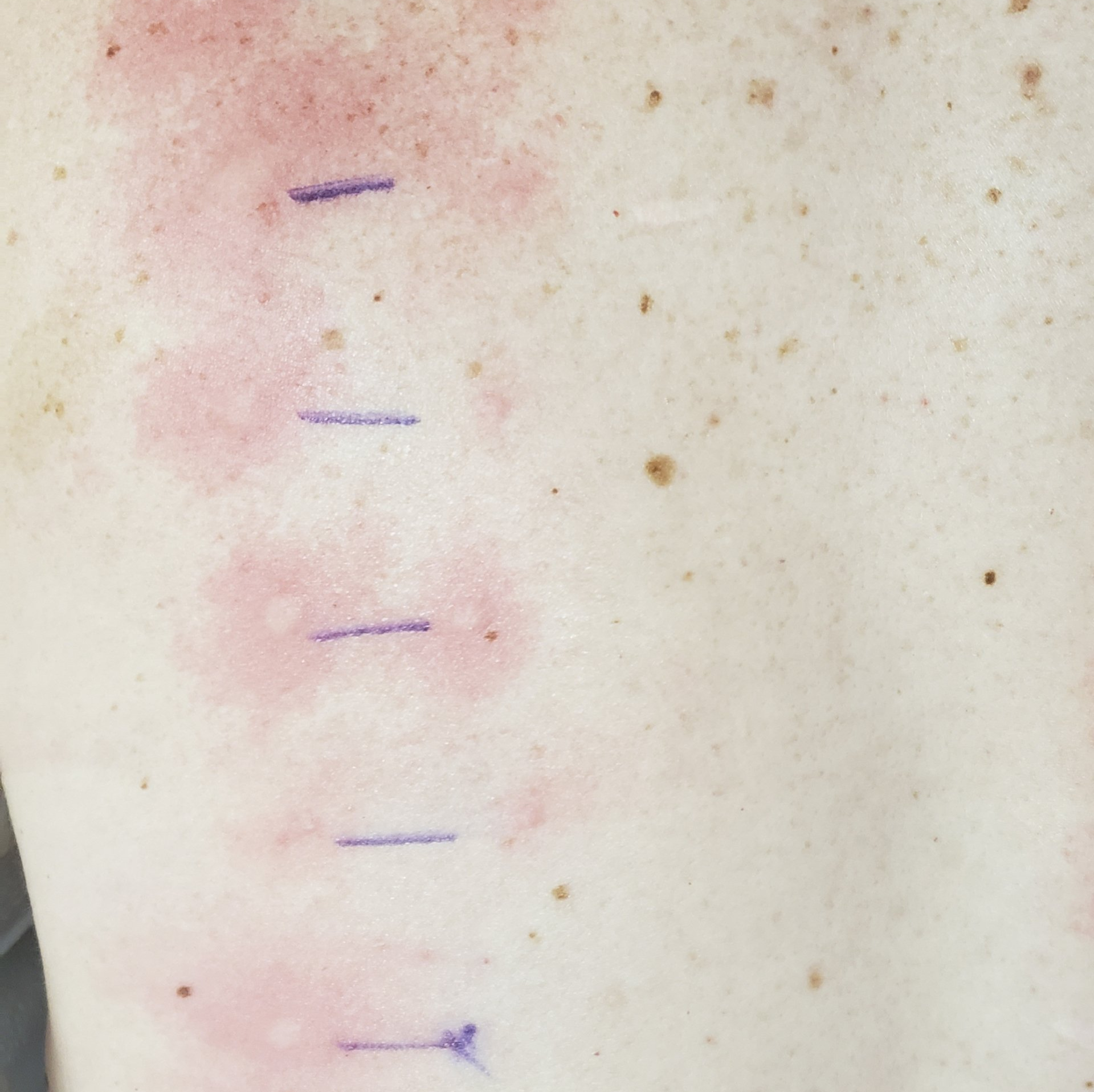Allergy & Asthma Specialists of KC
Offer a Full Range of Services and Treatments for Children and Adults including:
• Allergic Rhinitis (Hay Fever)
• Sinusitis (Acute/Chronic)
• Allergic Conjunctivitis
• Allergic Asthma
• Non-Allergic Asthma
• Food Allergy (Peanut Immunotherapy)
NOW OFFERING ALLERGY
DROPS
A specially formulated liquid placed under the tongue.
They are an alternative to allergy shots which is especially helpful for children, teens, and patients who fear needles. If your schedule does not allow office visits for allergy shots or you travel or live far away; allergy drops are the right choice for you
Find out if you’re a candidate for allergy drops, by clicking here to schedule an appointment.
Allergy Drops and Shots.
Immunotherapy is a natural way to help your body stop overreacting to allergens.
Allergy immunotherapy (allergy shots or drops) are a treatment that may reduce or eliminate your allergy symptoms.
Allergy shots and drops work like a vaccine. Your body responds to injected amounts of a particular allergen, given in gradually increasing doses, over a period of time, which allows tolerance to that allergen.
Allergy shots and drops have shown to decrease allergy and asthma symptoms. It can prevent the development of new allergies, and in children it may prevent the progression of allergic disease from allergic rhinitis to asthma.
The effectiveness of allergy shots appears to be related to the length of the treatment program, as well as the dose of the allergen. Many people experience lasting relief from allergy symptoms and reduce the need for traditional symptom relieving medications.
Among the wide variety of treatment possibilities available today, allergy immunotherapy, according to world health organization, is the only treatment that targets the cause of allergy, alters the natural course of the disease and has disease modifying impact.
- Symptoms:
Symptoms can include:
• Coughing
• Itchy, watery eyes
• Nasal congestion
• Post-nasal drip
• Runny nose
• Skin itching, swelling or hives
• Sneezing
• Wheezing
If you suspect that you or your family member is allergic to a environmental allergen, talk with an allergist about doing a skin test.
- Treatments:
Once potential allergens have been identified through the skin test, your allergist will work with you to develop a treatment plan. Depending on the type and severity of your symptoms, your treatment may include:
• Tips for how to avoid allergens
• Nasal irrigation (neti pot or other similar sinus rinse)
• Oral antihistimines
• Nasal steroids
• Eye drops
• Allergy immunotherapy
Start feeling better. Schedule an appointment with Dr. Khalid at our Gladstone office. 816-453-7771
- Allergy Shots Risks & Benefits:
Allergy Immunotherapy Risks and Benefits
Allergy immunotherapy is an effective treatment for allergic conditions such as perennial and seasonal allergic rhinitis or hay fever, asthma and stinging insect allergy. Immunotherapy should generally modify your allergic sensitivity and thereby reduce symptoms and the need for medication. Immunotherapy will not cure but will usually improve many of the symptoms and complications of allergic disease.
Traditional allergy immunotherapy or allergy shots is a medical treatment involving a series of injections with gradually increasing doses of a vaccine or extract made from the allergens to which you are allergic. This will have a specific effect on your allergy immune system increasing your immunity by stimulating the production of blocking antibodies. The allergy extract is specifically designed for you based on the results of an evaluation of your symptoms, medical history, physical findings and allergy testing. Allergy shots are given to patients of all ages depending on health status and indications.
Patients who are receiving high dose maintenance immunotherapy for a pollen, such as ragweed, will achieve approximately 80 to 90% reduction in their allergic symptoms, as well as, a possible reduction in the need for additional medication. For dust mites and pets a 60 to 70% reduction in symptoms may be realized. For mold the percentages are approximately 50 to 70%. Allergy immunotherapy is an alternative form of therapy used in conjunction with avoidance measures and medical therapy. Candidates for allergy immunotherapy are those who fail to do well on a medical regimen, have side effects to the medications or cannot completely avoid their allergens. Other criteria include those patients experiencing complications of their allergies out of control such as recurring infections.
Allergy injections are believed to be safe during pregnancy. Possible harm to your baby could occur if you have a major reaction to the injection with a drop in blood pressure and the need for oxygen and other treatment. We encourage conservative treatment during pregnancy and not advancing your dose above the maximum dose given prior to your pregnancy. The allergy injections will not cause or prevent allergies in your baby. Please arrange a follow-up visit if you become pregnant so that your allergy treatment program including medications can be reviewed. One of the benefits of continuing allergy immunotherapy during pregnancy is that you may need less of other medicines.
There are several medications particularly some blood pressure or headache medications known as beta blockers that should not be taken while on allergy immunotherapy. In addition to beta blockers, ACE inhibitors or antagonists, another type of blood pressure medication, should not be taken while on shots for stinging insects. Please notify our staff promptly of any new medications that have been prescribed for you since your last visit or allergy shot. Generally, there is no interference between allergy medications and allergy injections. As you begin your immunotherapy you should continue your prescribed medications, because immunotherapy will take time to become effective. As you reach the maintenance dose, you may find your need for allergy medications will decrease and you will be able to gradually reduce or discontinue some of your medications. However, you should always take an oral antihistamine on the day of the shot. Always talk with your physician before reducing any asthma medication.
Allergy shots are injected subcutaneously in the upper arm and are usually started at a very low dose. The dose is gradually increased on a regular basis through a series of four vials of increasing concentration until a therapeutic dose or maintenance dose is reached. An optimal maintenance dose is 0.3cc to 0.5cc of a 1:100 concentration but may differ from person to person. Although some patients may have to be maintained at a lower dose due to reactions, they may still realize benefit. Injections are typically given once or twice a week while the allergen dose is being increased. This frequency minimizes the chances of a reaction and the maintenance dose is reached within six to eight months. An alternative protocol for a quicker buildup is cluster immunotherapy. Three injections are given in the office over a two hour period once or twice a week for 4-5 visits. These patients will reach maintenance sooner but there is a slightly increased risk of a reaction to the shots. Occasionally, the buildup process is slowed or reduced due to shot reactions, large local reactions, increased symptoms, or missed shots.
The shot dose will be reduced if one misses more than 3-4 weeks of shots. If one misses more than 8 weeks of shots, the buildup process may have to be restarted from the beginning. After the maintenance dose is reached, injections may be given every one to four weeks depending on symptom improvement. Your progress is reassessed generally every 6 months with follow-up appointments. Improvement in your symptoms may not be immediate. Some patients may see improvement in symptoms as they reach maintenance, but it may take 6 to 18 months at maintenance before the full benefit of allergy immunotherapy is realized. If an individual shows no significant improvement after one and a half to two years of allergy immunotherapy, the shots will generally be discontinued or a reassessment may be undertaken. Patients who are doing well on immunotherapy will continue the treatment for three to five years, after which the need for continuation is reassessed.
There are risks associated with allergy injections. The risk is present because a substance to which you are known to be allergic is being injected into you. Some adverse reactions to allergy injections are potentially life-threatening and may require immediate medical attention. For this reason, immunotherapy should be given under the supervision of a physician in a facility equipped with the proper staff and equipment to identify and treat adverse or allergic reactions to allergy injections. You may receive your injections in our office or an outside facility under the supervision of a physician.
There are two types of adverse reactions that occur with immunotherapy, local and systemic/anaphylactic reactions. Local reactions are fairly common occurring at a rate of 3 to 5% and presents as redness and swelling at the injection site. This can happen immediately or several hours after the injection. These reactions are more likely to occur as you reach the higher concentrations and higher volume injections. You should notify the nurse if your local reaction is severe with significant swelling exceeding 2 inches in diameter or lasting until the following day. Also, occasionally a bruise may occur at the site of injection.
The second type of reaction is a systemic/anaphylactic reaction. These are much less common than local reactions occurring approximately one in 2500 injections. Systemic reactions are often mild and usually respond rapidly to medical therapy. Symptoms can include increased allergy symptoms such as sneezing, nasal congestion, coughing, hives, or itchy eyes, nose or skin. Rarely, a severe systemic reaction called anaphylaxis can develop after an immunotherapy injection. In addition to the symptoms associated with a mild systemic reaction, symptoms of an anaphylactic reaction can include swelling in the throat, respiratory difficulties, nausea, dizziness, abdominal cramping or a decrease in the blood pressure. Most reactions develop within 20 minutes of the allergy injection but may be delayed up to 2 hours. Most patients will be required to wait in the office 20 minutes for observation of any potential reaction. Occasionally, you may be required to stay longer for observation or treatment of a reaction. Patients with a higher risk of a reaction will be required to wait 30 minutes or longer and will be required to carry injectable epinephrine on shot days due potentially more serious systemic/anaphylactic reactions after leaving the office. These patients include those with previous systemic/anaphylactic reaction, some asthmatics and highly allergic individuals. Although not mandatory, all patients are advised to carry injectable epinephrine on shot days to treat systemic/anaphylactic reactions that may occur after leaving the office. A few deaths, perhaps two to three, are reported in the United States each year from allergy injections. This is a small percentage and most systemic reactions are not life threatening if treated promptly. You will always check with the nurse before leaving. If you do not have the time to wait after an injection, please do not come for your shot that day. It is better to come another day when you have the time to stay so that we may administer your injection safely. Also, we will postpone your shot if you are not feeling well. For example, if you have a fever, significantly increased allergy symptoms or have had wheezing associated with asthma recently. No strenuous exercise within four hours after an allergy shot is allowed due to potential increased allergen absorption. If you have any problems or questions, please discuss your options with our staff before your shot.
In summary, the goal of immunotherapy is to reduce allergic sensitivity with improvement in your quality of life at home, work or school. If you have any questions or have had a change in your medications which could conflict with allergy shots please notify our staff.
- What Are Food Allergies?
Food allergies are caused by a reaction the body has when it perceives a food as foreign. This type of allergy most commonly occurs in infants and young children, but can also occur in adults. Symptoms usually occur within five to 60 minutes of eating the food. When a severe reaction occurs, immediate treatment is required.
- Symptoms:
Symptoms of a food allergy include:
• Abdominal cramps
• Anaphylaxis or shock
• Chest tightness or trouble breating
• Diarrhea
• Difficulty swallowing
• Hives
• Itchy nose
• Sneezing
• Swelling of the face, throat, mouth or tongue
• Vomiting
• Watery eyes
- Most Common Food Allergies:
In certain cases, oral food challenges can be performed to rule out a food allergy In infants and young children, the most common food allergies are:
• Eggs
• Milk
• Peanuts
• Shellfish
• Soy
• Tree Nuts
Our allergists can help determine the cause of your allergic food reaction through various tests. In most cases, avoiding the culprit food is the recommended treatment. Your allergist will work with you to determine if other treatments are necessary.
- What Are Pet Allergies?
Pet allergies are caused by a reaction to airborne proteins from animal dander. In certain animals, allergenic proteins are found in high concentrations in urine. There is no such thing as an allergy-free or hypoallergenic animal.
- Most Common Animals that Cause Allergies:
The most common animals that cause allergic reactions include:
• Cats
• Dogs
• Guinea Pigs
• Mice
• Rabbits
- Symptoms:
Common symptoms that can occur after exposure to a pet include:
• Itchy eyes
• Rash after touching the animal
• Sneezing or runny nose
• Trouble breathing or wheezing
-
What is Sinus Disease?
Sinus disease presents as frequent or chronic sinus infections. Sinus disease may or may not be associated with nasal polyps
-
Symptoms :
Symptoms of chronic rhino-sinusitis must include two or more of the following:
●Nasal congestion
●Mucus discharge from the nose or mucus that drips down the back of the throat
●Facial pain, pressure, or "fullness"
●A decreased sense of smell
-
What Causes Frequent Infections?
Primary Immunodeficiency disorders causes children and adults to have infections that come back frequently or are unusually hard to cure.
-
Evaluation:
Diagnosed by laboratory work up.
-
Treatment
Management involves use of prophylactic antibiotics or immunoglobulin replacement therapy.
Drug Allergies
-
What Are Drug Allergies?
A drug allergy is an unexpected immune-mediated reaction to a medication. This is different from side effects or intolerances like nausea, upset stomach or diarrhea.
Symptoms include:
• Rash or hives
• Itching
• Wheezing or breathing problems
• Swelling
• Anaphylaxis
• Peeling of skin
• Blisters of skin or in mouth
A drug allergy can be difficult to diagnose and require a detailed history. In select cases, such as a penicillin drug allergy, skin testing is appropriate and can help determine if the allergy still exists.
- What Are The Signs of Asthma?
Many people first receive an asthma diagnosis after an asthma attack. In a severe asthma attack, you feel like you can't breathe or can't get enough air. Sudden asthma attacks, or exacerbations, can last from a few minutes to days. If left untreated, asthma attacks can be dangerous.
While asthma is a lifelong disease, most people have periodic attacks separated by symptoms-free periods. People with asthma may experience:
• Coughing, especially at night or early in the morning
• Wheezing (whistling or scratching sound when breathing)
• Trouble breathing
• Chest tightness
- Who Is Most Likely To Get Asthma?
People can develop asthmas at any age. The condition appears most often in children. You are at a greater risk if you have a family history of asthma or suffer from allergies. Other types of asthma include:
• Occupational asthma: This condition can happen when you breathe dust, chemicals or other irritants at work.
• Exercise-induced asthma: Some people wheeze or cough during physical activity. This type of asthma happens when you work out or do anything active. The condition is also called exercise-induced bronchoconstriction (EIB).
- How Is Asthma Diagnosed?
If you suspect that you or a loved one has asthma, you should see an asthma specialist. Our board-certified physicians are experts in diagnosing and treating adult asthma and pediatric (childhood) asthma.
- Evaluation:
We offer thorough evaluation and diagnosis of all types of asthma. Your doctor may request Spirometry.
• Spirometry: For this simple breathing test, you blow into a tube so we can measure your lung function. Sometimes we test you with and without an inhaler to see how reversible your lung function is.
- What Triggers An Asthma Attack?
A variety of factors may provoke an attack. Common triggers include:
• Allergens: Animal dander, mold, dust mites, pollen and certain food allergies
• Environmental factors: Changes in weather, air pollutants and irritants such as tobacco smoke
• Lifestyle traits: Exercise, stress and strong emotions
• Medications: Some pain medications and beta blockers
• Other medical conditions: Respiratory infections and gastroesophageal reflux disease (GERD)
- Asthma Treatment:
Once you have an asthma diagnosis, your allergist usually helps you treat and manage your asthma. The goal is to control inflammation, avoid triggers and make a plan to manage sudden attacks.
We develop a treatment plan specific to your health, your needs and your priorities. Your asthma plan may include:
Asthma medications: Doctors treat asthma with a variety of short- and long-term medications. Some of these medications are ones you inhale. We'll help you find the inhaler that works for you.
Advanced care for severe asthma: Severe asthma, also known as refractory asthma, doesn't respond to typical treatment. At Allergy & Asthma Specialists of Kansas City, we have the skills and the tools to offer solutions for refractory asthma including Allergen Immunotherapy and Biologics. We offer these therapies for those who qualify.
Eczema
- What is Eczema?
Eczema is a chronic skin condition that begins in the first few years of life. Children who have exzema can be more prone to develop other allergic conditions such as asthma or hay fever.
Symptoms of exzema include:
• Dry patches of skin that are red and itchy
• Cracked or scaly skin
• Blistering, weeping or peeling of skin
In infants, eczema usually appears on the face, neck, scalp, hands and feet. In older children and adults, eczema usually appears in elbow creases and behind the knees.
Our team at Allergy and Asthma Specialists of Kansas City can develop a skin care plan and prescribe topical medications to treat eczema. In special cases, identifying allergic triggers through skin or blood testing can be helpful. In refractory cases, biological agents such as Dupixent can be promising.
Allergic Rashes
- What Are Allergic Rashes?
Allergic rashes, also known as allergic contact dermatitis, can occur after an allergen or irritant touches the skin. This type of rash is different than hives or eczema, and typically appears one to four days after contact with an allergen or irritant.
- Symptoms:
Symptoms of allergic rashes include:
• Red bumps
• Blistering
• Itching or burning of the skin
• Swelling or oozing
- Common Causes?
Common causes of allergic contact dermatitis include:
• Metals such as nickel
• Preservatives in personal care products
• Latex
• Fragrances
• Topical antibiotics
Mild cases can be treated with topical steroid creams and oral antihistimines. Identifying an irritant with patch testing is also helpful.
- Evaluation:
What is Patch Testing?
Patch testing is a type of allergy testing involves applying patches with test substances in small chambers or discs to a person’s back or upper arm. The patient will return to our office in 48 hours to have the patches removed and read and the final read will be performed at 96 hours.
Chemical patch tests: are used to detect allergic contact dermatitis to something a person has contacted or exposed to.
Orthopedic patch tests: are used for patients who have had a reaction to the metal or one of the components such as bone cement, adhesives, etc. used during joint replacements.
Dental patch tests: can be done for people who are having problems in their mouth or gums after having various dental procedures.
Start feeling better. Schedule an appointment with Dr. Khalid at our Gladstone office. 816-453-7771
Hives
- What Are Hives?
Hives are temporary red, raised and itchy bumps and can be a sign of an allergic reaction. Most cases of hives go away on their own or can be treated with antihistamines. Skin testing can also be helpful after the hives have resolved to determine which allergen caused the reaction.
Hives that continue more than six weeks without a specific trigger are called chronic hives. In some cases of chronic hives there is an underlying cause, although these types of hives usually are not related to a specific allergen.
- Angioedema:
Angioedema is swelling of the soft tissues of the skin and mucus membranes that can occur with hives. Like hives, angioedema can occur in response to contact with an allergen. Either antihistamines or steroids can be used to treat the reaction. In some cases, angioedema may affect the face, throat and tongue, and requires immediate treatment.
- Hereditary Angioedema:
Hereditary angioedema -- not associated with hives -- is a rare genetic condition that involves swelling of the hands, face, feet, abdomen and airways. Special blood tests are required to make this diagnosis. Specific therapies are available to treat Hereditary angioedema.





